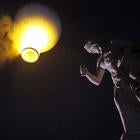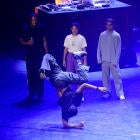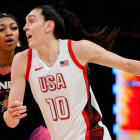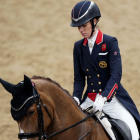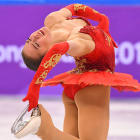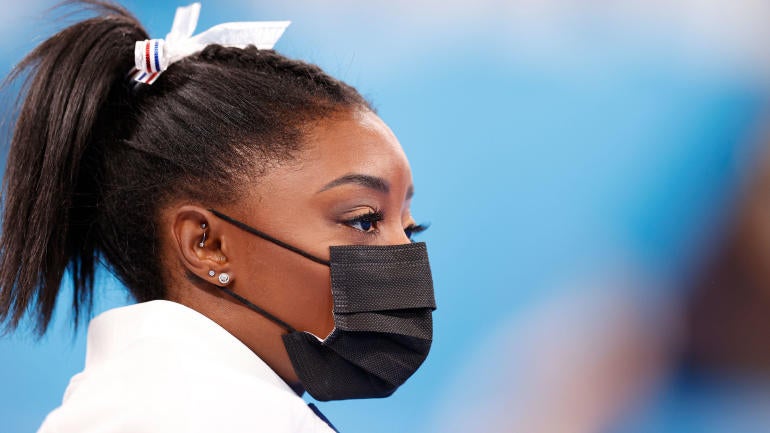
Simone Biles is such a revelation that she alone has redefined what is physically possible in her sport. How many athletes across American sports history can truly say the same?
When transcendent competitors like Biles come along -- the absolute greats, who are comet-like in their rarity -- their genius and mastery warp our sense of expectation. They are built up to be something more than human beings, at least in the arena of competition. Those who know gymnastics best will testify that Biles is the greatest in her sport's history. She entered these Games, understandably, as the most ballyhooed Olympian competing in Tokyo. Biles is so ambitiously competitive and athletic, there are now four moves named after her ... because no one before her had ever even successfully attempted them in competition.
Be it on the floor, on the beam, on the bars, or catapulting off the vault, Biles grew to a supernova sensation due to her dazzling reputation as an unbreakable competitor. She's a wonder; Biles dually represents gymnastics at its most awe-inspiring and least explainable.
But she is human.
And on Tuesday, one of the most significant moves Biles made in her career did not involve her hands, feet, legs, torso or arms -- but only her mind. It took less than a second. Most pivotally, it happened as Biles twisted through the air and turned upside down.
That's when something foreign flickered in her brain.
She lost perception on where, exactly, she was. For someone as brilliant as Biles, it might have also meant that, for a split second, she lost who she was. And when you consider how precise these gymnasts have to be not just to compete at an Olympic level, but to ensure their physical safety, then Biles' decision becomes that much more understandable.
Biles said she had no idea where she was in the air after her vault. Felt her head wasn’t in it and feared she might get hurt and spoil teammates’ medal chances if she continued.
— Helene Elliott (@helenenothelen) July 27, 2021
Citing her mental health, at the potential detriment of her team's chances of medaling, Biles backed out of the team final competition after an unusually poor attempt on vault. She alone made the decision. She wasn't forced into it. Yes, it rocked the world of gymnastics and immediately produced one of the biggest headlines of these Games -- because Biles isn't just America's biggest Olympic star, she is the quite possibly the greatest draw of any athlete from any nation in these Olympics.
Hello: these things are connected.
"I didn't want to go into any of the other events second-guessing myself," Biles told the media afterward. "So, I thought it would be better if I took a step back and let these girls go out there and do their job."
It's important for us to praise this decision rather than question it. Biles has nothing to prove to anyone. She's already the all-time greatest. Could there be a better advocate for mental health than arguably the most respected active Olympian in the world? Mental health is physical health and should be treated as such. Mental health can obviously impact physical well-being, too, and it's this that we should keep at the front of our minds when discussing Biles' choice to remove herself from competition for the betterment of her team and herself.
The team from the Russian Olympic Committee (Russia as a country, technically, is not represented at these Games) wound up winning gold, but to hear it from Biles, had she continued on there was a chance she could have further hurt Team USA's chances of getting to the podium at all. So credit to Grace McCallum, Sunisa Lee and Jordan Chiles, the U.S. gymnasts who rallied -- with Biles there, cheering them on -- to finish second in what was suddenly an even more pressurized spot.
"They were freaking out," Biles told NBC's Hoda Kotb of her teammates' reaction. "They were, like, crying and I was like, 'You guys need to relax. You're going to be fine.'"
They were more than fine; they were elite. Because they are. There's great pride in winning a silver medal. If anything, the Olympics is a terrific competition because it gives platform to not just first place but also second and third. Great achievement doesn't have to be, shouldn't always be, singular.
"I felt like it would be better to take a back seat," Biles said during the post-meet presser. "I didn't want to risk the team a medal because they worked way too hard for my screw ups."
That's some sort of quote from the greatest gymnast in history.
No one truly knows what Biles was feeling when she left her feet on that vault attempt and found herself in a headspace that was jarring enough to want her keep her toes on the ground for the remainder of the meet. Without knowing that feeling, all we should offer is support and empathy. She may have been no more sure hopping on a balance beam on Tuesday than me or you. That's powerful. For Biles to acknowledge this in real time and act upon it is even stronger.
Biles also said, "I think we're a little too stressed out. We should be out here having fun and that's just not the case."
This shouldn't be stunning. The pandemic isn't over. Olympians across the globe had to put their lives on hold for a year, and many have spoken about how that mentally and physically affected them as competitors.
"It's very uncharacteristic of me," Biles continued. "So it just sucks that it happens here at the Olympic Games than have it happen at any other time. But, you know, with the year that it's been, I'm really not surprised."
Biles has a deeper context to her journey that has to be discussed as well. She has gone on record and said, sadly, that one of her motivating factors to continue competing was her celebrity and influence on USA Gymnastics. Had she opted to retire prior to these Olympics, Biles felt like USA Gymnastics would not be, as an organization, held as accountable as it should be for its disgraces against dozens of former gymnasts who were abused by former USA Gymnastics trainer Larry Nassar. Biles is the only active gymnast in USA Gymnastics who doubles as a survivor from the Nassar era, and she carries this with her every day she practices, competes, exists as a member of Team USA.
And as a human being.
To live with that is to carry a burden no person should ever have.
Understand that, and you can understand how Biles arrives at a moment, in mid-air, where pressure, doubt and stress all converge in a split-second.
She made the right choice, the safe choice, and should be championed for being transparent about why she's doing what she's doing. Biles told NBC that, physically, she feels good. Whether or not she will perform in the individual all-around competition on Thursday is not yet known.
"Emotionally, that kind of varies on the time, in the moment," Biles told NBC.
The world wants to see greatness. It wants to see Simone Biles. But unless Biles wants it for herself, and for her teammates, then whatever everyone else wants simply doesn't matter. What she did Tuesday took as much courage and conviction as any gravity-defying move she's ever performed. We should all support this decision just as enthusiastically as anything else Biles has ever before on floor, beam or bar.








